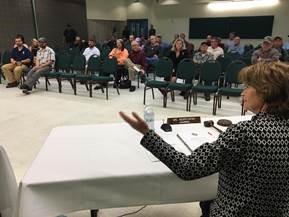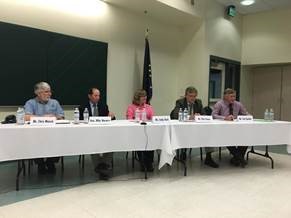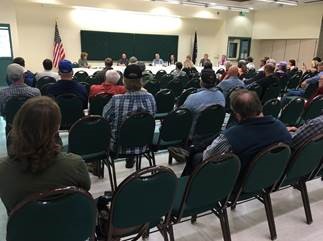Murkowski: Federal Government’s Failure on Forest Management is Hurting Alaska
Kenai, AK - U.S. Sen. Lisa Murkowski, R-Alaska, held a field hearing of the Senate Energy and Natural Resources Committee in Kenai to examine the challenges and impacts of federal regulations and wildfire management on outdoor recreation, hunting and fishing opportunities, and tourism on public lands on the Kenai Peninsula. Tuesday’s hearing follows Murkowski’s release of draft legislation that would end the destructive practice of fire-borrowing and promote better management of Alaska’s national forests.


“The federal government’s current practices are a terrible deal: we are losing our forests to insects, disease, and wildfires, and that is putting local communities at both physical risk and economic disadvantage,” Murkowski said. “Moving forward, the issues of wildfire funding and federal forest management must be addressed to ensure improved health and resilience of Alaska’s forests.”
Murkowski, chairman of the Senate Energy and Natural Resources Committee, sought input from Alaskans on how the federal government can better fulfill its duty to manage federal forests to prevent wildfires and end the practice of fire-borrowing for the benefit of Alaska.
Mr. John “Chris” Maisch, State Forester and Director of the Alaska Department of Natural Resources Division of Forestry, pointed to a specific provision in bipartisan draft legislation recently released by Murkowski and four of her Senate colleagues that would help with wildfire efforts in the state.
“The suggested efforts at streamlining the NEPA analysis for priority projects that address wildland fire issues to a limited set of alternatives, perhaps a no action and the recommended action are good suggestions and will streamline the process saving both time and funding for planning staff, since additional alternatives should not be required,” Maisch said.
Mr. Mike Navarre, Mayor of the Kenai Peninsula Borough, highlighted the borough as a premier destination that offers diverse recreation opportunities for both its residents and visitors. Navarre specifically spoke on the importance of healthy forests and collaboration between land managers at all levels of government.
“Fish and wildlife resources are not only prized, but are dependent on our stewardship to ensure healthy populations and habitats. Healthy forests provide and array of benefits including clean water for fish, habitat for animals to thrive and a variety of other uses of depending on resource management decisions. Healthy forests also tend to regulate the intensity of fire events,” Navarre said.

Ms. Cindy Clock, Executive Director of the Seward Chamber of Commerce, offered her insight on how the federal government can put in place better policies to help Seward and surrounding communities better maintain a year-round economy. Clock specifically called on the U.S. Forest Service to streamline the permit application process.
“I would like to address the permit application process. Anything that the U.S. Forest Service can do to streamline this process would be very much appreciated. As communities are encouraged to stand on their own by the State of Alaska during these very challenging economic times, the business community seeks to thrive and our Federal partners can help,” Clock said.
Mr. Rick Gease, Executive Director of the Kenai River Sportfishing Association, pointed to the large impact that federal agencies and regulations have on the Kenai Peninsula as nearly two-thirds of the peninsula is federal land.
“Federal regulations are a necessary component to well managed federal lands. But at times, they are also an unnecessary roadblock to smart government, where providing access and opportunity for outdoor recreation, hunting and fishing, and tourism are on par with environmental protections,” Gease said. “With a few tweaks (non controversial) on how we view wilderness, active vs. passive management, and funding restrictions, we can be a lot further down the road of ensuring both healthy economic activity in tandem with necessary ecosystem protections for the Kenai Peninsula and elsewhere in Alaska.”
Mr. Ted Spraker, from the Safari Club International, testified on some of the local concerns related to declining wildlife populations, restrictions to access, and the lack of protection from wildfires specifically pointing to the federal government’s wildfire management saying that communities on the peninsula are far from being protected.
“The current passive management approach on Refuge managed lands controlled burns have resulted in not only an unhealthy wildlife situation but a dangerously critical environment in the event of a large wildfire. We have been very lucky during the last two major fires, one day our luck will run out,” Spraker said.
Murkowski concluded Tuesday’s hearing pointing to her bipartisan draft legislation as an important first step in restoring local input in the management of Alaska’s forests while ending the destructive practice of fire-borrowing.








